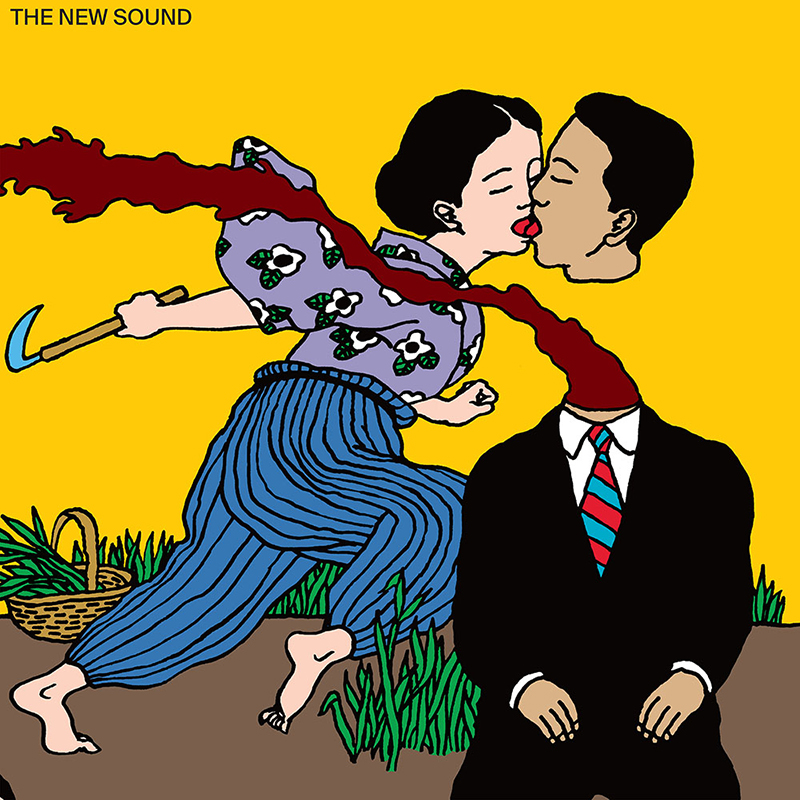Geordie Greep puts their rolling hiatus down to an experimental band falling into an ossifying routine. “We were playing around, but there wasn’t much progress in terms of coming up with stuff,” he says. “There wasn’t necessarily an album on the horizon. Why force it? You don’t have to get every bit of toothpaste out of the tube when you can have a nice, big, fresh, full one.”
His choice of terminology perhaps hints at something festering within the band, talking of playing big shows “on autopilot” and how “this tension to get it right” dissipated. Tellingly he refers to Simpson and bassist Cameron Picton not by name but rather as “these two guys” and pushes to talk of the band as a unit rather than any individual members. (Guitarist Matt Kwasniewski-Kelvin left in 2021 for mental health reasons.)
Writing and performing, he says, became locked in routine and felt like a chasing of tails creatively. “If we make another album, it will probably be just the same as one of the previous albums, maybe slightly better, maybe slightly worse, maybe about the same,” he sighs. “It didn’t seem that exciting.”
Staying together may have made more sense in terms of future earnings, but perhaps this would have been a betrayal of the freewheeling spirit that made them such an exciting proposition when debut single bmbmbm came out in 2018.
Geordie Greep’s album skips across math rock, jazz, bossa nova, torch songs, Broadway show tunes and country and western, arising from impromptu recording sessions in São Paulo that snowballed from an initial four tracks, eventually seeing 30 session musicians contribute. Greep uses the term “pastiche” a lot, pointing to The Beatles’ so-called White Album in 1968 as a possible guiding star, where the band raced through many of the different pop styles of the 20th century as they could.
The idea of using session musicians to free up the sound actually started percolating for Greep during Black Midi album recordings when they would bring in musician friends for overdubs. “I remember thinking at a certain point, ‘These guys are such great musicians. Wouldn’t it be interesting to just have them play the song?’” Greep explains about where he used this thinking to make The New Sound. “There’s an interesting thing where you get people playing songs that they haven’t written, and they play differently. There’s less self-consciousness because they’re not thinking, ‘My playing on this has to represent me.’ They just play the tune.”
With his staccato delivery, Geordie Greep’s words meld and trip over each other on the album, often surprising you when they lurch into the lasciviously surreal. He says he went to samba clubs to catalogue what he saw, like a priapic flâneur. Some of the lyrics are not for the sensitive. “You can still smell her snatch as you trawl the accounts,” he sings in Walk. “You have a bigger dick than any man who’s ever lived and you can cum more than a hundred stallions,” goes Blues.
Radio play, it is fair to conclude, was not a consideration making this album. Sex is something that is too often catalogued in a sanitised way, where “it’s all lovely and fantastic and a beautiful thing”, argues Greep. “But it can often be a very nasty business. Literally and materially. I’m just trying to, in a lot of instances, take the rose-tinted glasses off and show some crazy stuff going on for what it is. Try to see the humour in it.”
The album also lurches thematically across topics such as cannibalism and someone birthing a goat. He has previously described the through thread of the album as the story of “the museum of human suffering”, a bleak turn of phrase that’s more typical of Joy Division’s Closer or Manic Street Preachers’ The Holy Bible. He may be cataloguing the unspeakable and the extreme, but there is a tongue squarely in cheek throughout.
One solo album down, Geordie Greep is currently scoping out the next one. “I’ve already got the concept,” he says. “This album was recorded over a few months with lots of different recording sessions and lots of different musicians. I really want to try to do something which is more like [legendary jazz label] ECM Records, where it’s three days. Go in and record it in two days, mix it all on the third day and it’s done.”
He feels working within tight and predefined parameters is the catalyst to genuine creativity that Black Midi, for various reasons, started to lose. To that end, a return to the band is unlikely now, but not unlikely forever. “If the band thing becomes exciting again, we’ll see,” he says. “But the reason to do it has got to be that it has to be undeniable.”
The New Sound is out now on Rough Trade Records.
Do you have a story to tell or opinions to share about this? Get in touch and tell us more. Big Issue exists to give homeless and marginalised people the opportunity to earn an income. To support our work buy a copy of the magazine or get the app from the App Store or Google Play.










